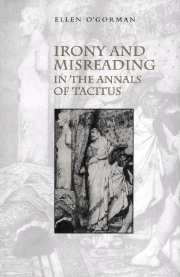Book contents
- Frontmatter
- Contents
- Dedication
- Preface
- 1 Introduction: irony, history, reading
- 2 Imperium sine fine:problems of definition in Annals 1
- 3 Germanicus and the reader in the text
- 4 Reading Tiberius at face value
- 5 Obliteration and the literate emperor
- 6 The empress's plot
- 7 Ghostwriting the emperor Nero
- 8 Conclusion: the end of history
- Bibliography
- General index
- Index locorum
8 - Conclusion: the end of history
Published online by Cambridge University Press: 30 September 2009
- Frontmatter
- Contents
- Dedication
- Preface
- 1 Introduction: irony, history, reading
- 2 Imperium sine fine:problems of definition in Annals 1
- 3 Germanicus and the reader in the text
- 4 Reading Tiberius at face value
- 5 Obliteration and the literate emperor
- 6 The empress's plot
- 7 Ghostwriting the emperor Nero
- 8 Conclusion: the end of history
- Bibliography
- General index
- Index locorum
Summary
It was history as a story that knew itself as such; it was politics as storytelling, the production of a narrative specifically intended to inspire in its audience a potential for change and to reclaim some kind of goal for a people thrown into confusion by the traumas of the past.
Shadi Bartsch, Ideology in Cold BloodThe narrative of the Annals breaks off in mid-sentence nearly halfway through book 16. It is a fortuitous and fitting break, for it emphasises the death of Thrasea Paetus, the senator whose determined display of ‘liberty’ has been recorded at various points in Tacitus' narrative. As his blood spatters on the ground he offers it as a libation to Jove the liberator and exhorts his son-in-law Helvidius Priscus to follow examples of constancy. The memory of Thrasea Paetus and Helvidius Priscus becomes a site of contestation between senatorial writers and the emperors (particularly Domitian) at the start of Tacitus' much earlier monograph, the Agricola.
We have read (legimus) that when Thrasea Paetus was praised by Arulenus Rusticus and Helvidius Priscus by Herennius Senecio, it was a capital crime, and cruelty was exercised not only against the authors, but also against their books, since the triumviral committee was delegated to ensure that these monuments to the noblest of talents (monumenta clarissimorum ingeniorum) were burnt in the comitium and forum.
(Agr.2.1)- Type
- Chapter
- Information
- Irony and Misreading in the Annals of Tacitus , pp. 176 - 183Publisher: Cambridge University PressPrint publication year: 2000



